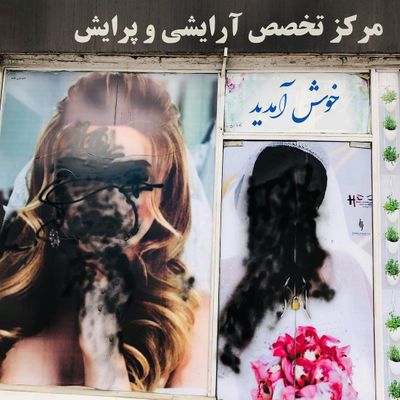
Tahria was watching TV with her family on Sunday when she saw that the Taliban had toppled the government in Kabul. “We just lost our hope,” she said. Since then they’ve been holed up in their apartment, terrified to go outside. The 28-year-old is worried she’ll be targeted by militants and that the professional life she has built will be destroyed by a regime hell-bent on depriving women of their basic rights. Tahria spent her childhood under Taliban rule, which barred women and girls from going to school, working, or leaving the house without a male escort. Those who didn’t comply with the rules suffered violent consequences, like whipping, stoning, and, in some cases, execution. Now that the militant group is back in power, Tahria and many other women are afraid of being confined to their homes, stripped of their agency, and controlled through violence.
Since the Taliban was toppled by U.S. troops in 2001, women have had more opportunities, in some cases even securing powerful positions in government and business. While the group’s leaders have tried to signal a more tempered regime, in some cities fighters have already sent women home from work and removed girls from schools. In rural villages, there have already been reports of fighters forcing women into marriage or lashing them for showing skin.
Tahria, who asked for a pseudonym to protect her safety, spoke with the Cut about the horror of being back under a repressive regime after decades of relative freedom.
As a little girl growing up under the Taliban’s rule, I wasn’t allowed in school. My family dressed me up as a boy and told me to go by the name Mohammad in class. They wanted me to get an education. I was the only girl there from my village, and I wasn’t supposed to tell anyone my real name. This was a difficult experience, but I’m also happy my parents made me go. Otherwise, I wouldn’t be where I am now.
I am part of the Hazara community, a minority group of Shiite Muslims who have been particularly persecuted by the Taliban. They don’t like that we believe in individual freedoms and respect the rights of women. When I was young, the militia blocked all of the highways so we couldn’t leave the Bamyan province, and we lived in poverty. It was a very hard situation, especially for women and girls who didn’t have much choice. Every day, I witnessed violence against my people.
I was 8 years old when the Taliban regime fell in 2001. I changed my clothes and could go to school with other girls. My little sisters grew up with a lot more freedom in Afghanistan. Women were allowed to leave the house, go to universities, and work. I thought it was good that U.S. troops were helping the Afghan people. They improved the economy, government, and democracy in the country, but we still had a lot of problems when it came to women’s rights.
In 2011, I moved to Kabul to study political science and law. At the same time, I started working as a journalist with a news agency, where I was interviewing government officials. It was a good feeling, but most of the Afghan media is run by men who don’t think women have reporting skills. A few years ago, I started my own publication; I now have a staff of five and some volunteers writing about issues like sexual abuse, harassment, and discrimination. Up until now, I’ve been covering the situation in my country, but this week I haven’t gone into the office. I’m worried for my safety.
My family and I were watching TV on Sunday when we saw the Taliban taking over Kabul. That was a very painful day for me. One of my friends called and we cried together. I’m afraid the Taliban will kill me. I’ve heard stories about militants going from house to house in Kabul searching for women, especially journalists. I’m worried there will be a knock on my door. I’ve interviewed a member of the Taliban before, so they know who I am. I’ve been very outspoken protesting the regime. But I’m very young, and I don’t want to die.
I live with my family and none of us are leaving the house right now. Because of my work they are also at risk. We’ve been eating and having tea together, discussing what to do next. My sisters, who are 19 and 18, said to me, “Now we can’t go to university.” It’s sad to think of other girls having to dress up like boys to go to school the way I did.
I don’t know what’s going to happen. In Afghanistan there are now a lot of women in government, journalism, and medicine. I hope the Taliban will let us keep our jobs, but they follow a very bad ideology. I’ve heard stories about fighters harassing young girls and forcing them to get married. I’m so worried. I can’t sleep. Our only choices are to fight for our lives or accept the Taliban and stay home.
For me, accepting the Taliban is impossible. I think the younger generation of Afghans like me will push back. I saw one tweet from a woman saying she would rather be killed than live under the Taliban’s rule. I’ve been checking social media, but I haven’t written or published anything yet. I thought best to stay silent. I’ll go back to work in a few days, even though it’s very risky. For now, it’s my right and responsibility to cover what’s happening in my country. But I don’t know how long I can stay here.
I think the U.S. is selfish for leaving Afghanistan without a plan to protect the country. It feels like America is playing a game with us. How is it possible that we’re in this situation? It’s unbelievable to me. I never thought that one day I would leave my country. Afghanistan is my home. It’s my hope. And my family and friends are here. How can I leave them? Unfortunately, it’s a very hard choice. Maybe they will come too. I don’t know where I’ll go, but when I find a way, I will likely leave this country to protect my own life.





